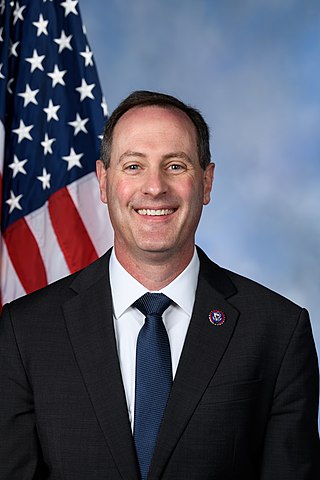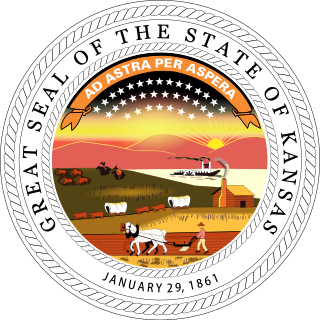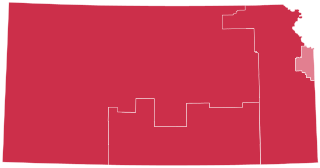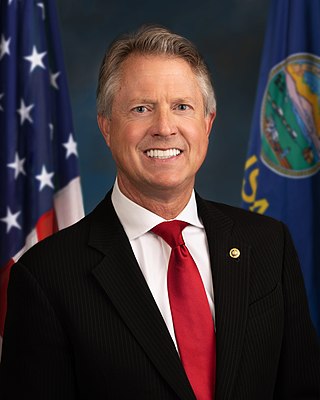
The Kansas Republican Party is the state affiliate political party in Kansas of the United States Republican Party. The Kansas Republican Party was organized in May 1859.

John Michael Hayden is a retired American politician and veteran who served as the 41st governor of Kansas, from 1987 to 1991. He subsequently served as the Secretary of the Kansas Wildlife and Parks Department under Kansas governors Kathleen Sebelius and Mark Parkinson.

Tracey Robert Mann is an American businessman and politician who has served as the U.S. representative from Kansas's 1st congressional district since 2021. The district, popularly known as "the Big First," includes parts of 63 counties in central and western Kansas and is the seventh-largest district in the nation that does not cover an entire state.
Paul T. Davis is an American politician and lawyer. A Democrat, he represented the 46th district in the Kansas House of Representatives from 2003 to 2015, serving as minority leader from 2009 to 2015. Davis was the unsuccessful Democratic Party nominee in Kansas's 2014 gubernatorial election and also ran a close campaign for Congress in Kansas's 2nd congressional district in 2018.

Timothy Alan Huelskamp is an American politician who was the U.S. representative for Kansas's 1st congressional district from 2011 to 2017. Huelskamp, a member of the Republican Party, was rated the least bipartisan member of the House during the 114th Congress by The Lugar Center - McCourt School of Public Policy Bipartisan Index. Prior to entering Congress, he represented the 38th district of the Kansas Senate from 1997 until 2011.
Roger P. Reitz is an American doctor and politician, who served as a Republican member of the Kansas Senate, representing the 22nd district from 2005 until 2013.

The 2014 United States Senate election in Kansas was held on November 4, 2014, to elect a member of the United States Senate to represent the State of Kansas, concurrently with other elections to the United States Senate in other states and elections to the United States House of Representatives and various state and local elections.
Garrett Love is an American Republican member of the Kansas Senate, representing the 38th district from 2011 until 2017. He has been given ratings of 67%, 75% and 83% from the American Conservative Union.

The 2014 United States House of Representatives elections in Kansas was held on Tuesday, November 4, 2014 to elect the four U.S. representatives from the state of Kansas, one from each of the state's four congressional districts. The elections will coincide with the elections of other federal and state offices, including the 2014 Kansas gubernatorial election.

A general election was held in the U.S. state of Kansas on November 4, 2014. Primary elections were held on August 5.

Gregory John Orman is an American politician, businessman, and entrepreneur. He ran as an independent to represent Kansas in the United States Senate in the 2014 election, earning 42.5 percent of the vote and losing to incumbent U.S. Senator Pat Roberts.

The 2016 United States Senate election in Kansas was held on November 8, 2016, to elect a member of the United States Senate to represent the State of Kansas, concurrently with the 2016 U.S. presidential election, as well as other elections to the United States Senate in other states and elections to the United States House of Representatives and various state and local elections. The primaries were held on August 2.

The 2016 United States House of Representatives elections in Kansas were held on November 8, 2016, to elect the four U.S. representatives from the state of Kansas, one from each of the state's four congressional districts. The elections coincided with the 2016 U.S. presidential election, as well as other elections to the House of Representatives, elections to the United States Senate and various state and local elections. The primaries were held on August 2.

The 2020 United States Senate election in Kansas was held on November 3, 2020, to elect a member of the United States Senate to represent the State of Kansas, concurrently with the 2020 U.S. presidential election, as well as other elections to the United States Senate, elections to the United States House of Representatives and various state and local elections.

The 2018 Kansas gubernatorial election took place on November 6, 2018, to elect the next governor of Kansas. Democratic nominee Laura Kelly won the election, defeating Republican nominee Kris Kobach and independent candidate Greg Orman.

Roger Wayne Marshall is an American politician, physician, and former military officer serving as the junior United States senator from Kansas since 2021. A member of the Republican Party, he served from 2017 to 2021 as the U.S. representative for Kansas's 1st congressional district, a mostly rural district covering much of the western and northern parts of the state.

The 2018 United States House of Representatives elections in Kansas were held on November 6, 2018, to elect the four U.S. representatives from the state of Kansas, one from each of the state's four congressional districts.

Lynn Wayne Rogers is an American politician and businessman who served as the 41st Kansas State Treasurer from 2021 to 2023. He previously served as the 51st lieutenant governor of Kansas from 2019 to 2021. A Democrat, he had previously served on the board of Wichita Public Schools from 2001 to 2017, and in the Kansas Senate representing the 25th district in west Wichita from 2017 to 2019.

The 2020 United States House of Representatives elections in Kansas was held on November 3, 2020, to elect the four U.S. representatives from the state of Kansas, one from each of the state's four congressional districts. The elections coincided with the 2020 U.S. presidential election, as well as other elections to the House of Representatives, elections to the United States Senate and various state and local elections.

A general election was held in the state of Kansas on November 6, 2018. Primary elections were held on August 7, 2018.
















